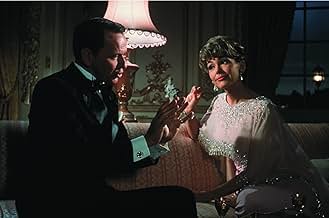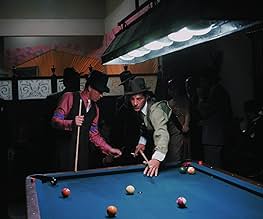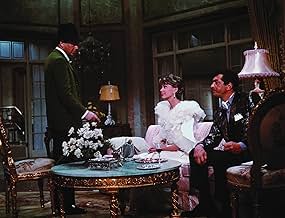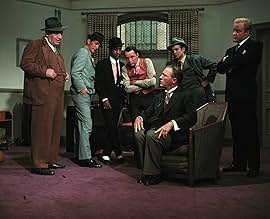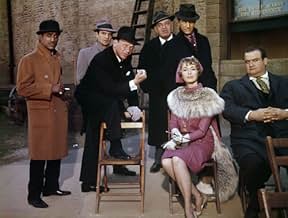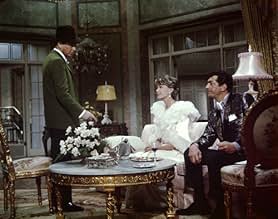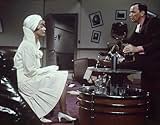IMDb रेटिंग
6.4/10
5.9 हज़ार
आपकी रेटिंग
अपनी भाषा में प्लॉट जोड़ेंIn Prohibition-era Chicago, two rival gangs compete for control of the city's rackets.In Prohibition-era Chicago, two rival gangs compete for control of the city's rackets.In Prohibition-era Chicago, two rival gangs compete for control of the city's rackets.
- 2 ऑस्कर के लिए नामांकित
- 6 कुल नामांकन
Jack La Rue
- Tomatoes
- (as Jack LaRue)
फ़ीचर्ड समीक्षाएं
To begin with, I recall catching the opening sequence of this one as a kid on a now-defunct Sicilian TV channel Considered the best of the Rat Pack films, this is a slick, likable and witty transposition of the Robin Hood legend to gangland Chicago. A generally bright outing, it loses steam towards the end, emerging as being decidedly overlong.
The stars are in their element – Frank Sinatra is Robin (called Robbo and clearly relishing the role, it’s hard not to be reminded of the star’s real-life mob connections), Dean Martin is Little John (their famous initial confrontation takes place over a game of pool!), Sammy Davis Jr. (who does a fair imitation of James Cagney) is Will Scarlett and Bing Crosby turns up half-way through as Allen A. Dale (this proved to be his last musical role). As for the villains, Peter Falk is wonderful as Guy Gisbourne (though he seemed stuck in gangster types during this time in his career) and heavy-set cocoa-drinking Victor Buono is the new Sheriff. However, I think it was a mistake to present Marian (Barbara Rush) as a femme fatale; appropriately, then, Edward G. Robinson (an icon of the gangster genre) cameos as Big Jim – the Richard the Lionheart figure. There are also notable bits by Hans Conried (as Robbo’s put-upon architect), Allen Jenkins (as a disgruntled partner of Falk’s) and Sig Ruman (as a leading citizen).
Though OCEAN’S 11 (1960) did provide a title tune sung by Davis, this is the only Rat Pack musical of the lot. Sinatra’s “My Kind Of Town” was nominated for an Oscar – but other songs are actually more memorably presented: Davis’ own energetic destruction (at the rhythm of a tap dance) of Falk’s gambling joint; “Style”, a momentous collaboration between Sinatra, Martin and Crosby (three of the best-loved crooners ever); and Crosby’s show-stopping “Mr. Booze” (at one point, to divert a police raid organized by rival Falk, Robin’s gang turns the joint into an impromptu temperance meeting!). With this in mind, the film has definite black comedy touches – particularly in the cornerstone-laying motif. However, the Christmasy finale in which the tables are once again turned in favor of Robbo and Rush is reformed (off-screen) by Crosby feels rushed.
Some trivia connected to the film: a kidnapping scene was dropped for hitting too close to home – Sinatra’s own kid had just been abducted and eventually ransomed for $250,000!; on the day JFK was shot dead, the scene of Robinson’s funeral was being filmed!; apparently, Sinatra’s old musical pal Gene Kelly was originally involved in the production as a dance director but left during its early stages after disagreeing with Sinatra (who also served here as producer) over the number of dance routines to be incorporated into the film.
The stars are in their element – Frank Sinatra is Robin (called Robbo and clearly relishing the role, it’s hard not to be reminded of the star’s real-life mob connections), Dean Martin is Little John (their famous initial confrontation takes place over a game of pool!), Sammy Davis Jr. (who does a fair imitation of James Cagney) is Will Scarlett and Bing Crosby turns up half-way through as Allen A. Dale (this proved to be his last musical role). As for the villains, Peter Falk is wonderful as Guy Gisbourne (though he seemed stuck in gangster types during this time in his career) and heavy-set cocoa-drinking Victor Buono is the new Sheriff. However, I think it was a mistake to present Marian (Barbara Rush) as a femme fatale; appropriately, then, Edward G. Robinson (an icon of the gangster genre) cameos as Big Jim – the Richard the Lionheart figure. There are also notable bits by Hans Conried (as Robbo’s put-upon architect), Allen Jenkins (as a disgruntled partner of Falk’s) and Sig Ruman (as a leading citizen).
Though OCEAN’S 11 (1960) did provide a title tune sung by Davis, this is the only Rat Pack musical of the lot. Sinatra’s “My Kind Of Town” was nominated for an Oscar – but other songs are actually more memorably presented: Davis’ own energetic destruction (at the rhythm of a tap dance) of Falk’s gambling joint; “Style”, a momentous collaboration between Sinatra, Martin and Crosby (three of the best-loved crooners ever); and Crosby’s show-stopping “Mr. Booze” (at one point, to divert a police raid organized by rival Falk, Robin’s gang turns the joint into an impromptu temperance meeting!). With this in mind, the film has definite black comedy touches – particularly in the cornerstone-laying motif. However, the Christmasy finale in which the tables are once again turned in favor of Robbo and Rush is reformed (off-screen) by Crosby feels rushed.
Some trivia connected to the film: a kidnapping scene was dropped for hitting too close to home – Sinatra’s own kid had just been abducted and eventually ransomed for $250,000!; on the day JFK was shot dead, the scene of Robinson’s funeral was being filmed!; apparently, Sinatra’s old musical pal Gene Kelly was originally involved in the production as a dance director but left during its early stages after disagreeing with Sinatra (who also served here as producer) over the number of dance routines to be incorporated into the film.
I consider this the best of all the Clan movies that Frank Sinatra did with his pallies. By the time Robin and the 7 Hoods was made, Sinatra's movie career consisted of a lot of sleep walking roles. But Frank still took his singing quite seriously and he's at the top of his game in this one.
Since he produced and starred in it naturally Frankie reserved for himself the best song in the Jimmy Van Heusen-Sammy Cahn score. My Kind of Town did for Chicago what New York, New York did for the Big Apple and was nominated for best song that year. Sinatra delivers it in grand style.
He gave a little something for everyone in the cast. Peter Falk who plays Guy Gisborne gets one of those once in a lifetime chances to overact with abandon and gusto. He looks like he's having a ball, especially singing All For One And One For All as he's electing himself numero uno of the Chicago gangs.
Sammy Davis, Jr. other than in Porgy and Bess and here got very little opportunity to show off his amazing multi-talents in film. His Bang Bang number as Frankie's crew is busting up Falk's speakeasy, displays those talents of singing, dancing and mimicry. Listen close and you'll Davis do some good imitations of Al Jolson and Jerry Lewis.
Bing Crosby in his last musical role plays Alan-A-Dale and he replaced Peter Lawford when he and Sinatra came to an abrupt parting of the ways. He's the secretary of an orphans home where Sinatra donates some hot money to launder it. Crosby's one solo number in this is Don't Be A Do-Badder which is vintage philosophical Bing and I'm sure Van Heusen and Cahn wrote it after the casting change was made.
Dean Martin got short changed here. I wish he'd been given something better as a solo than Any Man Who Loves His Mother.
There's a song on the cast album that is heard in the background called I Like To Lead When I Dance. It got cut from the film. It also appeared on other Sinatra albums and Old Blue Eyes does really well by it. I wish it had been left in.
You can't possibly go wrong with all the talent that Sinatra gathered for this film. It was his last musical role as well.
Since he produced and starred in it naturally Frankie reserved for himself the best song in the Jimmy Van Heusen-Sammy Cahn score. My Kind of Town did for Chicago what New York, New York did for the Big Apple and was nominated for best song that year. Sinatra delivers it in grand style.
He gave a little something for everyone in the cast. Peter Falk who plays Guy Gisborne gets one of those once in a lifetime chances to overact with abandon and gusto. He looks like he's having a ball, especially singing All For One And One For All as he's electing himself numero uno of the Chicago gangs.
Sammy Davis, Jr. other than in Porgy and Bess and here got very little opportunity to show off his amazing multi-talents in film. His Bang Bang number as Frankie's crew is busting up Falk's speakeasy, displays those talents of singing, dancing and mimicry. Listen close and you'll Davis do some good imitations of Al Jolson and Jerry Lewis.
Bing Crosby in his last musical role plays Alan-A-Dale and he replaced Peter Lawford when he and Sinatra came to an abrupt parting of the ways. He's the secretary of an orphans home where Sinatra donates some hot money to launder it. Crosby's one solo number in this is Don't Be A Do-Badder which is vintage philosophical Bing and I'm sure Van Heusen and Cahn wrote it after the casting change was made.
Dean Martin got short changed here. I wish he'd been given something better as a solo than Any Man Who Loves His Mother.
There's a song on the cast album that is heard in the background called I Like To Lead When I Dance. It got cut from the film. It also appeared on other Sinatra albums and Old Blue Eyes does really well by it. I wish it had been left in.
You can't possibly go wrong with all the talent that Sinatra gathered for this film. It was his last musical role as well.
Like we've taken the Robin Hood legend and changed the bows and arrows to machine guns! ... Like with songs yet! ... Like WILD! . In prohibition-era from 1920s Chicago, the racketeer marshal (Victor Buono) along with a mobster named Guy Gisborne , a corrupt(Peter Falk) who controls the south side , knock off the ringleader Big Jim (Edward G Robinson). Everyone falls in line behind Guy except the do-good gangster Robbo (Frank Sinatra) who rules north side in his last go-round . Robbo wishes to keep his own territory with a ¨Robbo project foundation¨ and his particular business . A pool-playing man from Indiana named Little John (Dean Martin)and the director of a boys' orphanage named Alen Dale (Bing Crosby) unite forces with Robbo and Will (Sammy Davis Jr). When he gives some money to the orphanage, he turns the toast of the town as a hood like Robin Hood and people shout ¨Chicago loves Robin¨. As Robbo along with his friends creates the ¨Robin Hood foundation¨ and a ¨Free soup kitchen¨ . Meanwhile, Guy schemes to get rid of Robbo, and Big Jim's heretofore unknown daughter named Marian (Barbara Rush) turns up and goes after from dudes attempting to encounter an ally in her quest to run the whole show. Later on , Robbo is detained and newspapers publicize : Robbo held for sheriff murder¨ .
This is an amusing musical comedy with some Hollywood major stars reunited by Frank ¨Robbo¨ Sinatra and incarnating Robin and his merry men in modern times , including usual names as Little John , Will Scarlett , Marian and Guy Gisborne . It's a ¨Rat Pack¨ version of 1920's Chicago with Frank Sinatra and his boys as do-good mobsters in their last outing . Fine musical numbers with beautiful songs by Nelson Riddle as ¨Bang, Bang¨ , ¨Mister Booze¨, ¨Don't be a do-baddler¨ and ¨My kind of town¨ with Dean Martin, Bing Crosby and Frank Sinatra singing and dancing and dressed in smoking , besides another sensational show including Crosby dancing with children . This is a typical Rat Pack vehicle such as ¨ Ocean's eleven(1960) ¨, ¨ Four for Texas (63)¨ and finally ¨Cannoball run II (1984)¨ with the sympathetic trio Frank Sinatra-Sammy Davis Jr-Dean Martin . The motion picture is professionally constructed by Gordon Douglas. This is one of various and mediocre works of his long career as filmmaker. He was a Hollywood veteran director, directing early movies (Little rascals, Spanky), expert on Western (Chuka,Rio Conchos, Yellowstone Kelly, Only the valiant ), and usually worked for Frank Sinatra in various films (Lady in Cement, Tony Rome,The detective, Robin and the 7 Hoods). Rating : Passable and acceptable , 5,5 . This is a nice musical entertainment and to be liked for Frank Sinatra fans.
This is an amusing musical comedy with some Hollywood major stars reunited by Frank ¨Robbo¨ Sinatra and incarnating Robin and his merry men in modern times , including usual names as Little John , Will Scarlett , Marian and Guy Gisborne . It's a ¨Rat Pack¨ version of 1920's Chicago with Frank Sinatra and his boys as do-good mobsters in their last outing . Fine musical numbers with beautiful songs by Nelson Riddle as ¨Bang, Bang¨ , ¨Mister Booze¨, ¨Don't be a do-baddler¨ and ¨My kind of town¨ with Dean Martin, Bing Crosby and Frank Sinatra singing and dancing and dressed in smoking , besides another sensational show including Crosby dancing with children . This is a typical Rat Pack vehicle such as ¨ Ocean's eleven(1960) ¨, ¨ Four for Texas (63)¨ and finally ¨Cannoball run II (1984)¨ with the sympathetic trio Frank Sinatra-Sammy Davis Jr-Dean Martin . The motion picture is professionally constructed by Gordon Douglas. This is one of various and mediocre works of his long career as filmmaker. He was a Hollywood veteran director, directing early movies (Little rascals, Spanky), expert on Western (Chuka,Rio Conchos, Yellowstone Kelly, Only the valiant ), and usually worked for Frank Sinatra in various films (Lady in Cement, Tony Rome,The detective, Robin and the 7 Hoods). Rating : Passable and acceptable , 5,5 . This is a nice musical entertainment and to be liked for Frank Sinatra fans.
I was expecting less, as I once saw this referred to somewhere as a "self-indulgent" effort from The Chairman of the Board. I found it, au contraire, to be a solidly entertaining, well-made comedic effort with high production values, beautifully shot (the film really needs letterbox to show it off; catch it on American Movie Classics). Good work from all the leads, Peter Falk in particular, as well as the many familiar charcter actors. It is interesting how Frank's outfit never seems to quite fit into the 1928 setting - he always seems ready to step off the screen into 1964 Las Vegas. The nostagically vaudevillian number "Style", sung by Frank, Dean, and Bing, is worth the whole movie. Well worth a see.
Of all the five films they did together, the legendary Rat Pack never had a better cinematic vehicle for their talents than right here! You get the feeling, right from the start, that Frankie, Dino, Sammy, Bing, and Peter Falk weren't really acting. They were cutting loose, having a ball, and loving every minute of it. And you will, too! Not only are there the great Cahn - Van Heusen songs, including the Oscar-nominated "My Kind of Town," but there's the legendary William Daniels' excellent color photography, and Don Feld's period costumes. And, in addition to the aforementioned Rats, the performances of Barbara Rush as Marian (The script implies that her maidenly status was long since spoken for!), the underrated Robert Foulk as the corrupt Sheriff Glick, the always-funny Victor Buono as his even more nefarious Deputy, Alvin Potts, and the always funny veterans Hank Henry, Richard Bakalyan, and Phil Arnold as various lovable lowlifes.
A couple of sad footnotes connected with this film, though: The funeral scene for Edward G. Robinson's character was filmed in an actual cemetery. While there, Sinatra, whose tumultuous relations with the Kennedys were well known, came across an actual gravestone for a "John F. Kennedy, 1800 - 1878." They joked about it the rest of the day, and drew a lot of disapproving looks, until someone turned on a car radio on the afternoon of November 22, 1963! Another scene, which was never used in the finished film, was a kidnapping scene, filmed the same day as Frank Jr. was kidnapped. For a film to be entertaining and funny under these circumstances is nothing short of amazing, but "Robin and the Seven Hoods" manages to be, in the last of the Rat Pack films, and the best one of all of them!
A couple of sad footnotes connected with this film, though: The funeral scene for Edward G. Robinson's character was filmed in an actual cemetery. While there, Sinatra, whose tumultuous relations with the Kennedys were well known, came across an actual gravestone for a "John F. Kennedy, 1800 - 1878." They joked about it the rest of the day, and drew a lot of disapproving looks, until someone turned on a car radio on the afternoon of November 22, 1963! Another scene, which was never used in the finished film, was a kidnapping scene, filmed the same day as Frank Jr. was kidnapped. For a film to be entertaining and funny under these circumstances is nothing short of amazing, but "Robin and the Seven Hoods" manages to be, in the last of the Rat Pack films, and the best one of all of them!
क्या आपको पता है
- ट्रिवियाOn the same day as the funeral scene was filmed, President John F. Kennedy (a personal friend of Frank Sinatra's) was assassinated.
- गूफ़When the cornerstone for the police station is being dedicated, and again when the pretzel factory cornerstone is being dedicated, mountains can be seen over the rooftops of the buildings in the background. There are no mountains in Chicago.
- भाव
Little John: When your opponent's sittin' there holding all aces, there's only one thing left to do: Kick over the table.
- कनेक्शनFeatured in It's Black Entertainment (2002)
- साउंडट्रैकMy Kind of Town
(uncredited)
Lyrics by Sammy Cahn
Music by Jimmy Van Heusen (as James Van Heusen)
Performed by Frank Sinatra
टॉप पसंद
रेटिंग देने के लिए साइन-इन करें और वैयक्तिकृत सुझावों के लिए वॉचलिस्ट करें
- How long is Robin and the 7 Hoods?Alexa द्वारा संचालित
विवरण
- रिलीज़ की तारीख़
- कंट्री ऑफ़ ओरिजिन
- भाषा
- इस रूप में भी जाना जाता है
- Robin Hood de Chicago
- फ़िल्माने की जगहें
- Rosedale Cemetary, लॉस एंजेल्स, कैलिफोर्निया, संयुक्त राज्य अमेरिका(cemetary scenes - now Angelus-Rosedale)
- उत्पादन कंपनियां
- IMDbPro पर और कंपनी क्रेडिट देखें
बॉक्स ऑफ़िस
- US और कनाडा में सकल
- $98,10,000
- चलने की अवधि
- 2 घं 3 मि(123 min)
- पक्ष अनुपात
- 2.35 : 1
इस पेज में योगदान दें
किसी बदलाव का सुझाव दें या अनुपलब्ध कॉन्टेंट जोड़ें


